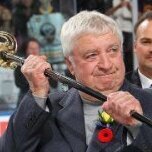-
Posts
46,204 -
Joined
-
Last visited
Content Type
Profiles
Forums
Events
Everything posted by PASabreFan
-

Ralph Krueger needs to go - like yesterday.
PASabreFan replied to MODO Hockey's topic in The Aud Club
Ownership had changed on Long Island and Lou was already there. They were not your father's Islanders. -
Somehow the translation resulted in more goodly English than most Americans goodly.
-
With all the chatter about Jack, I thought I'd better take a look-see for myself. Honest disclosure: with the idea floating around that Eichel's game is in disarray, there might be a slight bias in my observations toward negative plays, though I tried very hard to see the best in his night as well. I might have even tried too hard, so maybe the bias is in the other direction. First period Loses opening faceoff cleanly to Nelson. Fights for the puck along the left wing wall in the Islander zone and taps it to Reinhart, who can't control it. Zone cleared. Finishes shift by twice executing a strong forecheck. Shift grade: B. --- Drops another draw to start his shift. Rushes into the NYI zone but loses the puck. Skates hard on the backcheck, chasing Bailey down the left wing. Shift grade: C. --- In a scrum on the right wing wall in the Buffalo zone, Eichel tries to clear off the boards, but the puck goes directly to Pulock at the right point for the pass across and the drive (royalty PayPal-ed to Doc Emrick). Shift grade: D. --- Lead pass from his own blue line to Reinhart goes off 23's stick, and the Sabres have to retreat. Sabres start to press, and Eichel grabs the rebound in the left wing corner and sends the puck up the boards, missing Miller. Coasts slowly to the bench. Shift grade: C. --- Sabres power play. Eichel wins the draw; Varlamov save on Dahlin. Pass from the left edge of the left circle to the other edge is in Hall's skates. Feathers pass to Olofsson at the bottom of the right circle, with 68 looking to make a tic tac toe pass to Reinhart at the left post — but it's blocked and cleared. Fans cleanly on shot from the top of the right circle (brings puck back and loses control), and Isles rush down the ice. Stops skating on the backcheck, standing almost straight up as the puck is sent to the front of the Buffalo net. Drifts to the bench again. "Jack Eichel has turned the puck over three times so far in this first period inside the Islanders' blue line," Rob Ray notes. Shift grade: D. --- Backhand scoop pass springs Olofsson out of the Sabres' zone. Shift grade: C. --- Wins o-zone faceoff against Martin, setting up a quick shot by Olofsson from the top of the left circle, the first of several impressive glove saves by Varlamov. Isles ice it. Loses subsequent draw in the right circle. Steals drop pass inside Sabres' line and feeds Reinhart through center. Platters Dahlin for a one-timer in the high slot, but the shot is blocked. Pilfers pass at center ice and sends the puck back into his own zone. Shift grade: A. --- (Sabres take 1-0 lead on Lazar's goal.) --- Blocks centering pass by Cizikas with Martin cruising down the slot. Works hard in the left wing corner before tapping a loose puck weakly to Cizikas, who dishes the point as the Isles press in the final minute. Olofsson dangles through center, leading to a fast-developing two on one with Reinhart. Trailing Eichel seems to stop skating and gets bumped away from a caroming puck in the high slot by Clutterbuck. Isles rush back, and Eichel and Olofsson let up while Reinhart keeps his legs going. Martin shot from in-tight is saved by Ullmark. Shift grade: D. First period grade: C. When Rob Ray rags on you, it's a bad sign. --- Second period Gives puck away to Beauvillier on the left wing half wall of the Buffalo zone. Lead pass from same spot misses Mittelstadt badly and ends up on Mayfield's stick. Barzal lifts Eichel's stick in the right wing corner of the Sabres' zone, and Eichel sends the puck to an Islander at the point. But Barzal takes a penalty for tripping Eichel in the process. Shift grade: D. --- After an almost one-minute shift, Eichel is back out to take and win a faceoff to the right of Varlamov. Feeds Dahlin at center point for a one timer off Varlamov's glove. Cruises to the top of the left circle, and with all of Sabreland shrieking SHOOOOT!!!!, he does — and puts it cleanly off the left post. Tries to cut to the slot but is easily pushed to the ice by Mayfield. Shift grade: C. --- (Isles tie game at 1.) --- Loses faceoff cleanly. Passes crisply up the left wing wall of the Sabres' zone to Reinhart, who loses the puck to Pelech. Stabs puck off stick of Pageau at the top of the Sabres' right circle. Shift grade: B. --- Skates hard to get to Pulock at center and uses his reach to foil a pass meant for opposite Islander D. Steals puck at center, skates into the zone, throws some snow and connects with Reinhart for a tip shot. Shift grade: A. --- After icing, Eichel loses another faceoff, this time to the right of Varlamov. Isles clear. Behind Ullmark, Eichel puts the puck off of an Islander. While falling at center after a little shove in the back, backhands puck to Olofsson at the Isles' line. Forechecks strongly along with Olofsson, but the Isles again clear. Shift grade: C. --- Loses faceoff to the right of the Buffalo goal, leading to a Pulock one-timer and an Ullmark save. Has a clear step on Pelech at the red line with only one Isle to beat but is easily caught. Then tries to go around Pulock at the right dot and loses the puck. Knocked off the puck behind net by Pulock, stumbles and does the Reinhart helmet adjustment. Point blank save by Ullmark with Eichel late getting back and on cruise control. Shift grade: F. --- After doing a drive by of Nelson at center, leading to a scoring chance for the Isles, carries the puck into NY zone and drops it for Dahlin. Shift grade: C. Second period grade: C. A little better in spots and some bad luck, but Eichel earns another middling grade. --- Third period Loses opening faceoff. Grabs puck behind the net, sprints out and cleanly gives it away to Pulock for the right back in (cha-ching, Doc). Pass connects with Olofsson at the Isles' line. Drifts to bench again. Shift grade: D. --- (Islanders move into a 2-1 lead.) --- Loses draw. Solid backcheck on Nelson as the Isle drives to the left side of the Buffalo net. Puts his right shoulder into Pulock down the right wall of the NY zone, a rare physical engagement on the night by Eichel. Turns loose puck over for a Pelech shot from the top of the left circle. Shift grade: B. --- Sabres PP. Wins faceoff. Shot from near the left dot goes off Pulock with Reinhart setting the screen, and the puck goes out to center. On Take Two, edge to edge pass to Hall in the left circle this time is on target, and Hall just misses the left post. Feeds Dahlin before Reinhart lacrosses a remarkable Goal of the Year candidate to tie the game at 2. Shift grade: A. --- Carries to the Islander line, and pass toward Reinhart is off the mark and knocked down by Bailey. Shift grade: C. --- For a second shift in a row, speeds off the bench and into the corner of the offensive zone. After icing, easily loses faceoff to the right of Varlamov. Strong backcheck on Pageau, then carries into NY zone before tossing it to the middle of the ice onto Clutterbuck's stick. Backhands puck into feet of Reinhart just inside the Islander line. Shift grade: C. --- Inside of 10 minutes, the game and the individual performance are still salvageable. Loses yet another draw. Deftly avoids an Islander to maneuver below the goal line, check the puck off the stick of Pulock and feed Olofsson at the bottom left circle for a shot that just misses. Keeps Isle from breaking out on the right side, then knocks the puck down at the left point for the keep-in and the carry-on (I'm going broke here). Shift grade: A. --- Isles on the peeper. Takes a shift with about 45 seconds to kill and watches from the high slot as Islanders go up 3-2. Shift grade: C. --- Flies off the bench to check Beauvillier along the left wing boards of the NY zone. Hall then sends the loose puck to the front of net, but Cozens can't convert. Bumped into the boards at the left point and gives the puck away again. Chops the puck away from Pelech at Buffalo's center point with the Isles buzzing. Shift grade: B. --- Empty Buffalo net. Shoots the puck into Varlamov's glove from center. Easy clear for NY. Fights through check of Pageau and one-hands the puck to Olofsson on left wing. Pad save by Varlamov on Olofsson with Eichel weakly driving the slot. After a timeout, Staal takes the faceoff. On a scramble draw, Olofsson helps out and taps to Eichel at the left point with 25 to go. Makes a sharp backhand pass to Dahlin at the center point. Eichel one-timer from above the left circle near the boards hits Reinhart to the left of Varlamov. Game ovah. Shift grade: D. Third period grade: C (might as well be consistent). Uneven performance with Ullmark pulled perfectly summarized Jack's night, which was the definition of meh. Game grade: You know. C. Befitting for the Sabres' captain. This was Eichel's worst night on the dot this season, which has been the best of his career in that department. Jack hasn't been getting a lot of shots on goal in recent games, and this was no exception, with only three. After hitting that left post, Eichel remains stuck on two goals for the year, with none in seven games. Now mere points are getting hard to come by. Ice time of 23:01 was among his most this season, so no complaints there. He'd better be hurt and RaKru better be hiding it for whatever reason. If this is Healthy Eichel, this is truly a crisis for the Sabres franchise.
-
Rick had moved to TV. The Sabres didn't do the simulcast for those two seasons (95-96 and 96-97), although Lanny remembers Rick's TV call being available on FM radio. A Wikipedia page has Pete calling the games on WWKB-AM in 95-96 and then on WHTT-FM in 96-97. https://en.wikipedia.org/wiki/List_of_Buffalo_Sabres_broadcasters
-
I have a day off, woke up way too early and coffee is fueling a shift by shift examination of Eichel's play last night. I'll have my report in a bit. I refuse to believe Eichel isn't hurting. He's being easily moved off the puck and put on the ice, and he doesn't have that so-called burst. The man is not weak or lacking in speed. Something's up. If he's not hurt, we have big-time problems. In a word, through two period, the captain has been uneven.
-
Look to the cookie.
-
Bump. Show your faces.
-
I'd say closer to 24 months. Things tailed off starting in January 2019.
-
Sodie pops in the press box?
-
Pete Weber. He called games on radio in 95-96 and 96-97. He's a terrific broadcaster and went on to do Predators games. I recall Pete saying, with a standing ovation ongoing before the final faceoff at the Aud, "This is the Aud the way everyone will remember it." Chills. He also had an awesome call of Plante's OT winner in '97.
-
When asked how long he intended to own the team, Terry motioned toward his children in the front row and said something like, "You're looking at the answer right here." (Very unsure of the wording, but that was the gist of it.) Two of his kids were adults then and are now 10 years older. Let's go.
-
Absolutely. Which is why an owner shouldn't be "running" anything without the hockey chops necessary to do so.
-
I'm having trouble finding the full presser.
-

Ralph Krueger needs to go - like yesterday.
PASabreFan replied to MODO Hockey's topic in The Aud Club
You're BARKING up the wrong tree. Miss ya Clipper. -
You asked about his headspace. It would have been on you.
-
We can't have anything nice. Screw you, hockey gods.
-
All linesmen look like the linesman from Goon.
-
That's a Sammer for sure.
-
-
Eichel FO% by season 1 — 41 2 — 38.9 3 — 41.5 4 — 47 5 — 46.9 6 — 53.4
-
These goals are shocking, shocking good.
-
-
"...in a 12:30 start."





